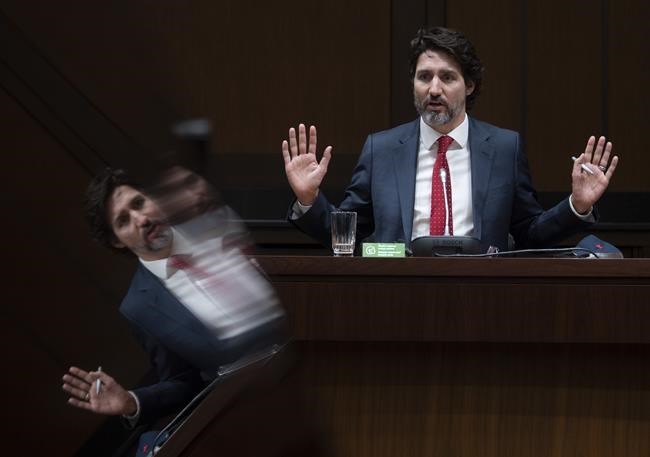OTTAWA — Prime Minister Justin Trudeau says one of the top priorities for the next commander of the Canadian Armed Forces will be tackling systemic racism and rooting extremism from the ranks.
The comments are the first from the prime minister since Gen. Jonathan Vance announced in July that he was preparing to step down after more than five years as Canada's chief of the defence staff.
While multiple sources have told The Canadian Press that other senior commanders were interviewed for the job in September, the Liberal government has yet to name Vance's successor.
Some have suggested that the government may be taking its time in appointing a replacement in part because of the military's involvement in distributing COVID-19 vaccines across the country.
In an interview with The Canadian Press, Trudeau indicated without providing details that a new defence chief will be named soon, and the prime minister laid out what he is looking for in the next commander of the Canadian Armed Forces.
"Someone who brings obviously significant operational and strategic skills, but someone who will be very much focused on the institutional transformations that are necessary," Trudeau said.
That includes fighting systemic racism and creating what Trudeau described as a more inclusive military "where there is less of the concerning, troubling reports of extremism that continue to bounce up every now and then."
Such reports have included a number of high-profile cases in recent years, including one former Canadian Army reservist who was an alleged recruiter for a neo-Nazi group and is now in custody on firearms charges in the U.S.
The military is also investigating the 4th Canadian Ranger Group over concerns some members are associated with right-wing groups.
One member was arrested in July after allegedly driving a truck through the gates of Rideau Hall with a loaded weapon and uttering threats against Trudeau.
Military intelligence has previously identified dozens of other active service members as belonging to hate groups or having made racist or discriminatory statements. While some have been forced from the military, others have been allowed to stay after being disciplined.
Trudeau said such actions and views are not shared by the vast majority of Canadian Armed Forces members, “who are extraordinary in their commitment and service not just to their country, but to their fellow Canadians.”
However, he added, “there is work to do to improve, and to make that organization better reflect and exemplify the values and ambitions of Canadians for a fair country.”
Individual military commanders, including those in charge of the Canadian Army, Royal Canadian Navy and the Royal Canadian Air Force have all issued orders and directives in recent months aimed at eliminating system racism and hateful conduct.
The military has also been working — with mixed results — to make its ranks more diverse by recruiting more women, visible minorities, Indigenous Canadians as well as members of the LGBTQ community.
The focus on ridding the ranks of hate follows an earlier emphasis on eliminating sexual misconduct from the Forces, which started in earnest when Vance launched an all-out assault on such behaviour upon becoming chief of the defence staff in July 2015.
Speculation about the next defence chief has been rife since Vance announced his plan to step down, with some questioning whether the Liberals would appoint Canada’s first female chief of the defence staff in Lt.-Gen. Christine Whitecross.
The other likely candidates include Lt.-Gen. Mike Rouleau, the current vice-chief of the defence staff, Navy commander Vice-Admiral Art McDonald, Air Force commander Lt.-Gen. Al Meinzinger, and Army commander Lt.-Gen. Wayne Eyre.
This report by The Canadian Press was first published Dec. 16, 2020.
Lee Berthiaume, The Canadian Press



